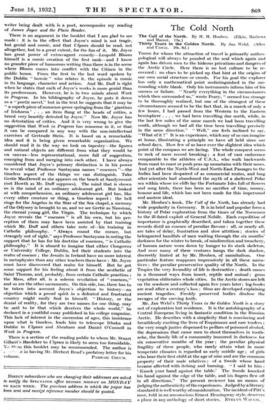The Cold North
Thirty Years in the Golden North. By Jan Welzl. (Allen and Unwin. 10s. 6d.) Thirty Years in the Golden North. By Jan Welzl. (Allen and Unwin. 10s. 6d.) THOSE for whom the attraction of travel is primarily anthro- pological will always be puzzled at the zeal which again and again has driven men to the hideous privations and dangers of the Arctic Circle. Here there is no lost culture to be re- covered ; no clues to be picked up that hint at the origins of our own social structure or creeds. For his goal the explorer has only a mathematical point undistinguished in the sur- rounding white blank. Only his instruments inform him of his success or failure. " Nearly everything in the circumstances which then surrounded us," wrote Peary, " seemed too strange to be thoroughly realized, but one of the strangest of these circumstances seemed to be the fact that, in a march of only a few hours, I had passed from the Western to the Eastern hemisphere . . . we had been travelling due north, while, in the last few miles of the same march we had been travelling south, although we had all the time been travelling precisely in the same direction." " Well," one feels inclined to say. " What of it ?" It is an experience, which any of us can imagine at home, illustrating a principle we have all held since our school days. How few of us have ever the slightest idea which point of the compass we are facing. The whole conquest seems to reek of mere record breaking ; a feat of vast endurams, comparable to the athletes of U.S.A., who walk backwards from coast to coast or push peas up mountains with their noses. And yet after the North-West and North-East Passages to the Indies had been despaired of as commercial routes, and long after scientists had abandoned the myth of a sheltered Polar sea within whose ice cliffs lay the Fortunate Isles full of flowers and song birds, there has been no sacrifice of time, money, honour and life, which has not been made for this impersonal and austere ideal.
Mr. Ilouben's book, The Call of the North, has already had wide popularity in Germany. It is in brief and popular form a history of Polar exploration from the times of the Norsemen to the ill-fated exploit of General Nobile. Each expedition of importance is graphically described, and taken together these records distil an essence of peculiar flavour : all, or nearly all, are tales of delay, frustration and slow attrition ; stories of beleaguered handfuls of men waiting through the six months' darkness for the winter to break, of misdirection and treachery; of human nature worn down by hunger to its stark skeleton. And over ninny of these ventures hangs the (lark shadow, discreetly hinted at by Mr. Houben, of cannibalism. One particular feature reappears impressively in all these narra- tives: the peculiar preservative quality of the North. In the Tropics the very fecundity of life is destructive ; death comcs in a thousand ways from insect, reptile and animal ; gross vegetation obliterates whole cities. In the Arctic stores are left on the seashore and collected again five years later; log-books are read after a century's loss ; films are developed explaining ancient tragedies. Freshly preserved bodies disclose the ravages of the carving knife.
Mr. Jan Welzl's Thirty Years in the Golden North is a story not of exploration but residence. It is the autobiography of a Central European living in fantastic condition in the Russian Arctic. Ile describes with a simplicity that is convincing and breathlessly exciting the lives of Esquimaux and rare traders ; the very rough justice. dispensed to pedlars of poisoned alcohol, the depressions that cause men to shoot themselves in tooth- ache, the family life of a conununity immured in darkness for six consecutive months of the year ; the peculiar physical fragility of these people, who rarely attain what in more temperate climates is regarded as early middle age ; of girls who bear their first child at the age of nine and arc the common property of their male relatives ; of a Swede whose hand became affected with itching and burning. " I said to him : ` Knock your hand against the table.' The Swede knocked his hand against the edge of the table, and his fingers flew off in all directions." The present reviewer has no means of judging the authenticity of the experiences. Judged by a literary standard it is well worthy of consideration. The incident of Pitt's nose, told in an unconscious Ernest Hemingway style, deserves a place in any anthology of short stories.. EVELYN WAUGH.








































 Previous page
Previous page